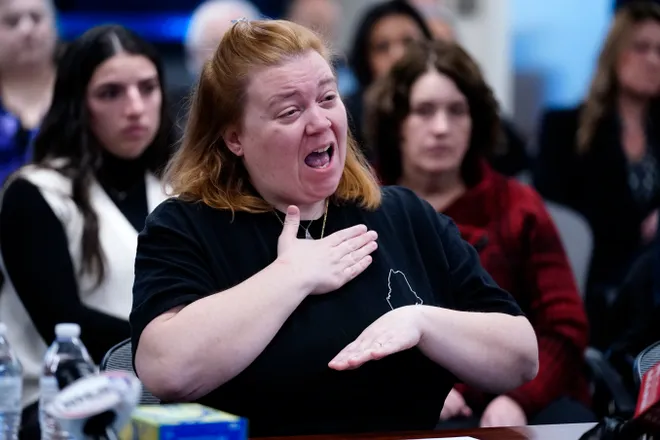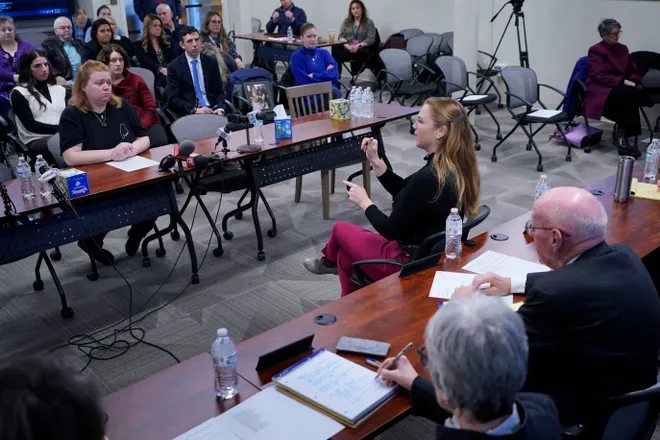As Maine governor pushes for new gun laws, Lewiston shooting victims' families speak out
Family members of the victims of an October mass shooting in Maine spoke publicly of their devastating loss on Thursday, days after the state's governor announced a push for new gun regulations after Maine's existing laws failed to confiscate the shooter's guns.
An independent commission established by Gov. Janet Mills to investigate the tragedy heard from family members of the 18 people who were killed when Robert Card, a 40-year-old Army reservist suffering from a mental health crisis, opened fire at a local restaurant and a bowling alley in Lewiston.
“The system failed, and we can’t allow this to happen again," Kathleen Walker said.
Walker's husband Jason died after he reportedly rushed at the shooter.

Other speakers who addressed the commission included Stacy Cyr, Elizabeth Seal, and Megan Vozzella, who lost their partners in the shooting. Vozzella said her husband was killed two weeks before their first wedding anniversary. Seal, who is deaf, said the death of her husband Joshua left her to raise four children alone.
The emotional testimonies came after Mills laid out a new legislative plan to expand Maine's background checks for gun sales and close a loophole in the state's "yellow flag" law that allows law enforcement a pathway to take guns from someone deemed a danger to themselves or others in her State of the State address on Tuesday.
The new law would allow law enforcement to go directly to a judge for approval to take someone's weapons without holding a court hearing.
Maine's gun laws came under scrutiny in the wake of revelations that local deputies knew of Card's deteriorating mental state months before the shooting, but failed to take his guns or take him into custody.
"We know that, in the case of the Lewiston shooter, law enforcement officers were not able to take him into protective custody to initiate our extreme risk protection law to remove his weapons," Mills said during her address.

In testimony before the Independent Commission on Jan. 25, Sagadahoc County Sheriff Joel Merry defended his office's choice not to arrest Card.
“There is always after a tragedy an opportunity to wonder if more could have been done. But that analysis must always take into consideration the limitations placed on law enforcement by the law at the time of the event,” Merry told the commission.
Documents from the Sagadahoc County Sheriff's Office revealed after the shooting that deputies received multiple warnings of Card's concerning mental state in the months before the shooting, even visiting his trailer twice in the month before. Authorities issued a "File 6" alert warning law enforcement personnel throughout the state to be on the lookout for him.
Merry was also in communication with Card's supervisors in the Army, whose concerns led New York State troopers to perform a welfare check on Card in July 2023. One letter sent to Merry cited a friend of Card's who told Army officials that he feared "Card is going to snap and commit a mass shooting.”

More:Police officer in Wilbraham, Mass., seriously injured in shooting; suspect in custody
Maine governor proposes expanded background checks
A second prong of Mills' proposed bill would require private gun sellers to run a criminal background check on all buyers in the state.
Although state laws already mandate federally-licensed firearm dealers to run background checks before gun purchases, the same requirements don't stand for firearm purchases from private dealers.
"It's not a process that works well when that very same person can walk out of a gun shop and go to Facebook marketplace, or Craigslist, or Uncle Henry's and buy through private commercial sale the same weapon they were just denied, a weapon they're not legally allowed to have," Mills said.
Lawmakers previously attempted to pass legislation that would close the loophole, but have not been successful.
In 2016, Maine voters also rejected a referendum that would have expanded background checks on gun purchases in the state.
Mills said that framed her thinking on the subject until the carnage of the October shooting.
"I don’t know how we can allow people who legally cannot have guns to buy them through a private sale and pose a risk to themselves or the public," Mills said during her speech.
Mills formed the independent commission in November to investigate the facts surrounding the Lewiston mass shooting. Its next meeting is scheduled for Feb. 15, when it will hear testimony from Maine State Police.
Contributing: Associated Press
Cybele Mayes-Osterman is a breaking news reporter for USA Today. Reach her on email at cmayesosterman@usatoday.com. Follow her on X @CybeleMO.
Disclaimer: The copyright of this article belongs to the original author. Reposting this article is solely for the purpose of information dissemination and does not constitute any investment advice. If there is any infringement, please contact us immediately. We will make corrections or deletions as necessary. Thank you.





